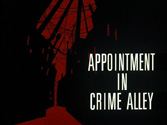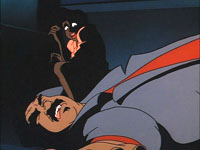|
||
|
| Credits | Cast | |
Written by Gerry Conway Directed by Boyd Kirkland Music by Stuart V. Balcomb Animation by Dong Yang |
Kevin Conroy as Bruce Wayne Efrem Zimbalist, Jr. as Alfred Diana Muldaur as Dr. Leslie Thompkins Mari Devon as Summer Gleeson Ed Asner as Roland Daggett |
Angel Harper as Woman David L. Lander as Nitro Bob Ridgely as Madman Alexander Simmons as Girl Jeffrey Tambor as Crocker |
|
But someone else in the series carries a grudge, even though we never get to see the particular circumstances. The series’ title character also has cause to complain, which is why he engages some of his adversaries with something that looks a lot like tough love. Of course, Bruce Wayne’s personal tragedy occurred far in the past, and (of course) we don’t need to see it to know about it and understand its consequences. Occasionally we see allusions to it, and our protagonist’s entire demeanor is one of guilt grimly discharged onto other targets. But when you get right down to it, Bruce Wayne’s tragic history is mostly irrelevant to the adventures of Batman. There is no reason to dwell on the past, even if the hero himself is never free of it. That’s as it should be. Fans sometimes feel that they’re missing out on something because Timm and company never dramatized that night in the alley. But that reticence, in fact, follows necessarily from their own preferred vision of the character. If Batman is the “real” person, then what happened to Bruce Wayne can only be an abstract, motivational kind of thing. Batman is a crime fighter: though what happened a quarter-century before explains why he fights crime, his being is now bound up in what he does, not in how he got there. To see this, think back to Return of the Joker, to the Joker’s infamous taunt: “Behind all the sturm and batarangs, you’re just a little boy in a playsuit crying for mommy and daddy.” The jibe stings because it’s a perversion of the truth. But on that loss Batman has built a new life and purpose: he has transmuted his own loss into others’ salvation. And it’s that salvific purpose that distinguishes the Bat from his otherwise similar adversaries. Recurrence to origins explains relatively little about him, whereas it explains everything about them. Still, the ever present pain of that loss is occasionally illustrated, sometimes ham-handedly and sometimes bathetically. With its setting, “Appointment in Crime Alley” promises something artful. The neighborhood where Thomas and Martha Wayne were gunned down still exists, but as more than haunted ground. That murder was stupid and senseless, borne of the despair of chronic poverty. But the people who still make Crime Alley their home are not the ghosts of criminals but the descendents of their victims. They are like Batman’s siblings, people similarly ruined by the decay and suffering but who have not lost their decency. When he looks upon them, he sees not the class that killed his (wealthy) parents, but the individuals he is trying to save.
The rest of the story is a melodramatic farrago. All praise to Batman for never forgetting the lives and dignity of the underclass, but Daggett, with his plans for urban renewal, also has a point. Leslie Thompkins is full of kind words and noble intentions, but only Daggett has a vision that goes beyond palliatives toward something like a cure. The causes of systemic poverty are complicated and obscure, but they clearly have something to do with the bad habits that viciously regressive communities (like Crime Alley) instill in their members. The destruction of the neighborhood and the scattering of its inhabitants, in the long run, might be the only cure for their dysfunction. Instead of dramatizing this difficult choice between the (possibly misguided) preferences of the community and the (possibly mistaken) prescription of the developers—the choice, that is, between the dignity of the individual and the health of the community—the story plays Daggett for all the oily malice it can summon. As with “The Forgotten” and "Lock-Up," “Appointment in Crime Alley” winds up preferring theatrical evil to serious drama. |
|
Production Notes Michael Reaves: "Originally this story was written to satisfy a request by the network. They wanted a day in the life of Batman. We tried to make that work, and realized we couldn't, because you need an engine to drive the story. There had to be some reason for us to keep watching." |
|
Related Episodes |
What Others Are Saying ... |
| Back to Almost Got 'Im |
Forward to Avatar |



